City Debates 2023 Bios

Richard Dunning works at the interface of housing delivery and planning. Drawing from behavioural economics, his research focuses on explaining human decision-making in the built environment. Richard’s research frequently considers calculations of housing need; the relationship between public outcomes and land value capture; and cycling infrastructures. His work has been funded by multiple research councils (ESRC, EPSRC and NERC), as well as governments (national and local) and charities (e.g. RICS Research Trust, Nuffield Foundation). Richard’s research has been instrumental in defining affordable housing subsidies in Scotland and determining land value capture mechanisms in England. He is currently working on: the relationship between land value capture and air quality with colleagues in China, the Netherlands and France; land value capture for resilient coasts; and suburban densification in Germany, France and the UK. Richard is the Co-Editor-in-Chief of Housing and Society..

Tom Goodfellow is a Professor of Urban Studies and International Development at the University of Sheffield. His research focuses on the political economy of urban development and change in Africa, particularly the politics of urban land and infrastructure, land value capture and taxation, urban conflict and institutional change. He has conducted research in Ethiopia, Uganda, Rwanda, Nigeria, Tanzania and Kenya, with a range of institutional partners in Africa including Makerere University, Addis Ababa University, University of Lagos and University of the Witwatersrand. His current and recent research is mostly funded by the UK Economic and Social Research Council and Global Challenges Research Fund. He is author of Politics and the Urban Frontier: Transformation and Divergence in Late Urbanizing East Africa (Oxford University Press, 2022) and co-author of Cities and Development (Routledge, 2016).

Sonia Guelton is a Professor at the Parisian School of Urban Planning and studies (France). She is an academic researcher since 1995 and a professional expert in territorial development analysis, land and real estate policy, project financing and urban socio-economic analysis and development. She is involved in international academic research projects in the field of Land Value capture and contributes to recent publications (Lincoln Institute, OECD, COST Program PuVaCa). She is president of a national Think Tank on land issues (Fonciers en débat) and she is a member of international research associations on land property and development. She also advices professionals and local Authorities on the impact of land policies and fiscal policies on urban developments.

Astrid Haas is an independent urban economist, working across research and practice. She has worked extensively with city governments across Africa and Asia in her diverse roles. She is currently also an Extraordinary Lecturer in the Department of Economics at the University of Pretoria and a Fellow at the Infrastructure Institute at the School of Cities at the University of Toronto. She holds an MSc in Public Financial Management from the School of Oriental and African Studies and an MA in International Economics and International Development from Johns Hopkins University. In 2016, she was nominated by the University of Cape Town as one of Africa’s Young Leaders and in 2020 she received Johns Hopkins University’s Outstanding Recent Graduate Award, for her work on urbanisation. For more information please see: www.astridrnhaas.com
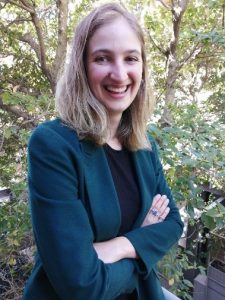
Claudia Hitzeroth is a Project Officer at the Development Action Group, a Cape Town-based non-profit organisation specialising in urban land and housing. Her work focuses on institutionalising relevant land-based financing and land value capture strategies in South African metropolitan cities. She is particularly interested in the use of Land Value Capture as a funding mechanism for spatial transformation and inclusion. She holds a Masters degree in Sustainable Urban Development from the Bartlett Development Planning Unit, UCL, and a BSc in Environmental Sciences from University of Cape Town.
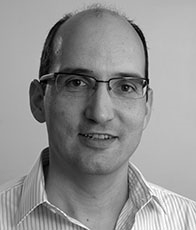
Nikos Karadimitriou is Associate Professor in Planning and Urban Development at the Bartlett School of Planning, UCL. His latest research focuses on land value capture for the provision of public goods, the governance of development rights allocation and the way in which urban development modalities affect multiple deprivation patterns. His most recent publications analyze planning reform efforts in Greece during the public debt crisis, the way public value capture could be used to fund climate change resilient urban infrastructure and the way housing markets shape the spatiality of multiple deprivation and social segregation. He has recently contributed to the European Commission’s Sustainable Urban Development Handbook and was lead author in UN Habitat’s “State of Addis Ababa, Vol II” report.
Nikos’ advisory work has focused on supporting local, regional and national authorities as well as the European Commission’s DG Regio and JRC, with evidence-based policy formulation. He has also advised the EIB and the World Bank on project prioritization in investment programmes. He has provided technical support to local authorities in Europe and Africa for the implementation of blue-green infrastructure as well as climate change adaptation and mitigation investments, in the context of urban resilience strategies and Integrated Climate Action Plans.

Deena Khalil is a development planner and urban researcher who is currently Manager of the Middle East and North Africa Urban Housing Practitioners Hub (MENA-UHPH) at Habitat for Humanity International, as well as adjunct Assistant Professor in the Sociology Department at the American University in Cairo (AUC) and a founding member of the Network of Urban Studies in Egypt (NUSE). Prior to this, Deena was a postdoctoral fellow at the Centre D’études et de Documentation économiques, Juridiques et Sociales (CEDEJ), and Research Manager at Takween Integrated Community Development. She holds a Ph.D. in Development Planning from University College London (UCL) and a M.A. in Economics of International Development from AUC.
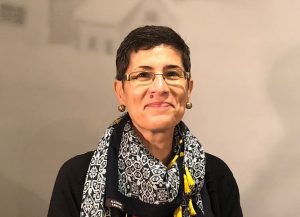
Mona Khechen is an independent urban and regional development planner and researcher. She has worked with the private and the non-profit sectors in Lebanon and abroad (Afghanistan, Iraq, Syria, and the USA) and acted as a lead consultant on various projects and policy-oriented studies supported by international institutions and agencies (AFD, EIB, ESCWA, GLTN, UNDP, UN-Habitat, and the World Bank). Her professional work addresses development planning challenges in contexts of rapid urbanization, climate change, conflict, poverty, and massive population movements, and, concurrently, advocates strategic, sustainable, inclusive, and participatory responses. Her research interests include land governance, spatial politics, cultural landscapes, seascapes, heritage and identity, urban transformations, and gentrification. She holds a BArch from the American University of Beirut, MSc in Development and Planning from University College London, and a Doctor of Design (PhD equivalent) from Harvard University.
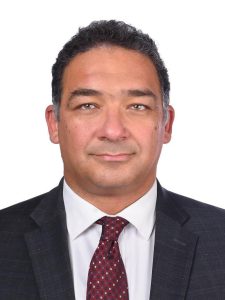
Mohamed Nada is a Senior Urban Specialist for the World Bank’s Urban, Disaster Risk Management, Resilience and Land Global Practice- MENA Region. In this capacity, Mr. Nada is leading a portfolio of investment projects, program-for-results and development policies focusing on decentralization, lagging regions, and property registration. He is also leading various advisory services and analytics focusing on sustainable urbanization, urban governance and decentralization, land administration and asset management, land-based financing, and climate change. Prior to this, Mr. Nada served as the Program Manager for the Urban Policies, Governance and Legislation Program at the UN-Habitat- Regional Office for Arab States, where he led various projects focusing on designing national urban policies, reforming the legal framework governing local government and land administration, and developing regional and urban development plans. He also severed as the Program Director for the Governance and Civic Engagement program at CARE International in Egypt where he managed several projects focusing on local governance, climate change and youth and women empowerment. Mr. Nada is currently a PhD research fellow at the Institute of Housing and Urban Development Studies, Erasmus University, Netherlands and he holds a master’s degree in Environment and Development from the School of Development Studies, University of East Anglia- UK. He has also undertaken several postgraduate fellowships and degrees focusing on local governance, land management and informal settlements regularization, legal drafting, and marketing.

Enrique R. Silva is Vice President of Programs at the Lincoln Institute of Land Policy where he leads the development of the Institute’s overall strategic program by overseeing and coordinating workplans and strategies from across the Institute’s Pathway to Impact goal areas and global areas of work. As Vice President, Silva leads the Institute’s annual planning and budgeting process in coordination with the President and CEO and the Vice-President of Operations. Silva is also responsible for the identification and oversight of existing and new initiatives that leverage the Lincoln Institute’s resources and expand its presence globally. In addition, he also leads a portfolio of projects and initiatives in Africa, co-directs the Institute’s Masters in Land Policy and Sustainable Development with Spain’s National University of Distance Education, and assists in the development and management of projects on land policy and urbanization in Latin America. Silva collaborates on the development and management of initiatives that focus on a range of themes from land-based fiscal instruments to the fiscal and land policy dimensions of large-scale urban projects to planning regimes and climate change adaptation. Silva also teaches courses on land policy, as well as urban governance and the politics of planning at Harvard University’s Graduate School of Design. Prior to his arrival at the Lincoln Institute, Silva was an assistant professor of city planning and urban affairs and the program coordinator for the graduate programs in city planning and urban affairs at Boston University. Silva holds a Ph.D. in city and regional planning from the University of California, Berkeley, an M.S. in planning from the University of Toronto, and a B.A. in political science from Columbia University.

Francisco Sabatini, sociologist from the Catholic University of Chile (CUCH) and Ph.D. in Urban Planning from the University of California, Los Angeles, is full professor at the Universidad del Bío-Bío in the city of Concepción, Chile, and at the CUCH in the capital city of Santiago. His research and lecturing have covered residential segregation, gentrification, local environmental conflicts and urban land markets and policy. He is part of the faculty of the Lincoln Institute of Land Policy and, today, a member of the Advisory Council of the national housing policy of Chile. Recent published pieces are “City and segregation shaken by capitalism: critique of the idealist approaches” (in Revista Urbano #42, 2021); and “Dimension spatiale de la transformation capitaliste de la ville chilienne : réflexions à partir de trois paradoxes” (in Fuster et al, Eds., 2021, Habiter les villes latino-americaines, Paris: L’Harmattan).
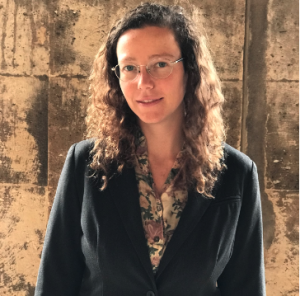
Mariona Segú is an Assistant Professor at THEMA and CY Cergy Paris Université since September 2021 and an IEB Research Affiliate. Previously, she was a post-doc researcher at INED working on the ANR project WORKLIFE. She obtained a PhD in Economics from Université Paris-Saclay and RITM in 2020. Her main research fields are Urban Economics, Housing Economics, Public Policy and Environmental Economics. She is interested in understanding housing markets, the structure and development of cities and the role played by public authorities. Her recent research projects have addressed the tax on vacant apartments and the entry of airbnb in the housing market. Her on-going projects focus on the development of bike-lanes networks, rent control regulation and zero-interest green loans. Her work has been published in the Journal of Public Economics and the Journal of Urban Economics.
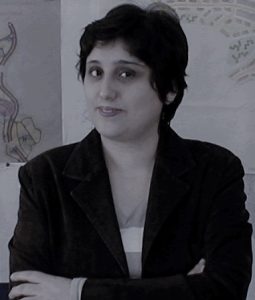
Sevkiye Sence TURK is a professor at the Department of Urban and Regional Planning in the Faculty of Architecture at the Istanbul Technical University (ITU). Her main interests are urban legal and administrative aspects in the development of the built environment, land development processes, the use of land readjustment (LR) in urban areas, value capture instruments and policies, serviced land supply for housing and location theory.
She has published articles on these topics in internationally recognised and respected journals, has published articles in national journals, international and national books and book chapters, and has published and presented papers at international and national conferences. The work entitled “Land Readjustment Experience in Turkey”, which was prepared by UN-Habitat, was published as a book by UN-Habitat in 2014. In 2017, a book titled ‘Location Theory and Applications: Housing, Shopping Centres, Offices, Hotels, Industry, Warehouses, Universities, Dormitories, Hospitals, Cultural Facilities, Green Areas”. Also in 2017, her book entitled “Planning Principles and Criteria in Urban Renewal Practices”. Her work “Could Land Readjustment be participatory and inclusive in Turkey?” was published as a book chapter in the book “Global Experiences in Land Readjustment”, published by UN-Habitat in 2018. She has been involved in various national and international research projects related to issues of urban planning and land development, either as a coordinator or as a researcher.

Helen Rourke has twenty years of experience in the urban development sector with a focus on low-income and affordable housing, neighbourhood regeneration, inclusionary housing, informal settlements and Land Value Capture. Her work is driven by a deep commitment to address issues of spatial inequality in cities through innovative urban governance and partnerships, evidence-based research, and community- based planning. Helen is currently the Programme Director of a Cape Town based non-profit, the Development Action Group established in 1986. DAG is widely considered as a leading NGO in the field of urban development in South Africa and has been at the forefront of housing delivery and urban policy development for over 35 years.
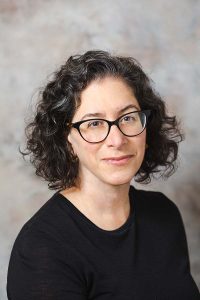
Rachel Weber is a professor in the Urban Planning and Policy Department at the University of Illinois at Chicago where she researches topics in urban economic development, real estate, and public finance. She is the co-editor of the Oxford Handbook of Urban Planning, a compilation of 40 essays by leading urban scholars. Her book, From Boom to Bubble: How Finance Built the New Chicago (University of Chicago Press, 2016) won the Best Book Award from the Urban Affairs Association. She is the author of over 45 peer-reviewed journal articles, as well as numerous book chapters and reports. She has served as an advisor to planning agencies, political candidates, and community organizations on issues related to financial incentives, property taxes, and neighborhood change. She was appointed to then-presidential candidate Barack Obama´s Urban Policy Committee and by Chicago Mayor Rahm Emanuel to the Tax Increment Financing Reform Task Force.
Discussants and Moderators

Sami Atallah is the Founding Director of The Policy Initiative. He is trained in economics and political science, and was the director of the Lebanese Center for Policy Studies from January 2011 till December 2020. He led several policy studies on political and social sectarianism, the performance of parliament, government monitoring, electoral behavior, the role of municipalities in dealing with the Syrian refugee crisis, municipal finance, economic diversification and industrial policy, and oil and gas governance. He has several policy and academic publications. He is the editor of Towards Achieving a Transparent and Accountable National Budget in Lebanon (Beirut: LCPS 2013), co-editor of Local Governments and Public Goods: Assessing Decentralization in the Arab World (with Mona Harb, Beirut: LCPS 2015), co-editor of Hollowing out the Lebanese Parliament (2009-2017) (with Nayla Geagea, Beirut: LCPS 2018), and co-editor of The Future of Oil in Lebanon: Energy, Politics, and Economic Growth (with Bassam Fattouh, I.B. Tauris 2020).
In addition to his research, Atallah served on the committee established by the Lebanese prime minister to draft a decentralization law and participated in the deliberations of the parliamentary committee which reviewed the draft law. He holds an MA in International and Development Economics from Yale University, an MA in Quantitative Methods from Columbia University, and a PhD in Politics from New York University.

Camillo Boano is full professor in Urban Design and Critical Theory at The Bartlett Development Planning Unit (DPU) and full professor in Architecture and Urban Design at the Politecnico di Torino, Italy. He is co-director of the UCL Urban Laboratory. Camillo’s research has centered on the interfaces between critical theory, radical philosophy, and urban design processes. He is working on a series of interconnected research projects in Latin America, Southeast Asia, and the Middle East on urban infrastructures, habitability, urban informality and displacement. He is the author of The Ethics of Potential Urbanism. Critical Encounters between Giorgio Agamben and Architecture (Routledge, 2017) and with Cristina Bianchetti of Lifelines: Politics, ethics, and the affective economy of inhabiting (Jovis, 2022) among others published works.

Mona Harb is a Professor of Urban Studies and Politics at the American University of Beirut where she is also co-founder and research lead at the Beirut Urban Lab. Her research investigates governance and territoriality in contexts of contested sovereignty; urban activism and oppositional politics; and how people make collective life in fragmented cities. She is the author of Le Hezbollah à Beirut: de la banlieue à la ville, co-author of Leisurely Islam: Negotiating Geography and Morality in Shi’i South Beirut (with Lara Deeb), co-editor of Local Governments and Public Goods: Assessing Decentralization in the Arab World (with Sami Atallah), and co-editor of Refugees as City-Makers (with Mona Fawaz et al.). She serves on the editorial boards of MELG, IJMES, EPC, and CSSAME.
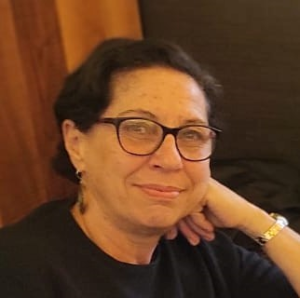
Raghda Jaber is a practicing urban planner with over 37 years of professional experience. She is currently working as an independent consultant in Lebanon to several United Nations Development Programme, United Nations Office of Project Services, and International Labor Organization projects where she manages feasibility and impact assessment of many asset-based urban improvement and re-development interventions. Raghda served as the Senior Policy Adviser at the Supreme Council for Planning (SCP) in Oman, from April 2016-January 2020—a super cabinet agency tasked with land and real estate development. She also served as Senior Advisor to Lebanon’s Presidency of Council of Ministers, responsible for strategic management, project formulation, and general policy support for the European Union Aid Portfolio during 2010-2012. For 12 years (1995-2007), Raghda was the National Coordinator in the Implementation Unit of the Land Registry Modernization Project—a $50 million joint project of the World Bank, United Nations Development Programme project, Canadian International Aid Agency, Dutch Development Agency—at the Lebanese Ministry of Finance. Raghda has a City Planning Master’s Degree from the Massachusetts Institute of Technology (MIT) and an Architecture bachelor’s degree from the American University of Beirut. While doing her Master’s at MIT she was a recipient of the prestigious U.S. Fulbright Scholarship.
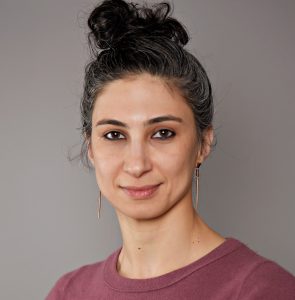
Nada Moumtaz is Associate Professor in the Department for the Study of Religion & in Near and Middle Eastern Civilizations at the University of Toronto. After a Bachelor of Architecture at the American University of Beirut, she received her PhD in Cultural Anthropology from the Graduate Center of the City University of New York. Her research stands at the intersection of the anthropology of Islam, Islamic legal studies, studies of capitalism, and urban studies and spans the nineteenth and twenty-first centuries in the Levant, with a focus on Beirut, Lebanon. Her book God’s Property: Islam, Charity, and the Modern State was published in 2021. Her latest article, “Gucci and the Waqf: Inalienability in postwar Reconstruction in Beirut,” is coming out in the March issue of American Anthropologist.
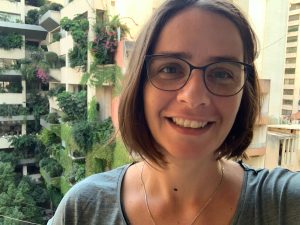
Elizabeth Saleh is an Assistant Professor in Socio-Cultural Anthropology at the American University of Beirut. She works at the intersection of political and economic anthropology. Her first long-term ethnographic fieldwork was based in Lebanon’s Bekaa Valley and culminated in 2014, in her doctoral thesis about the Lebanese wine industry. Elizabeth’s current ethnographic research began in 2015 and is about the lives of underage Syrian waste pickers growing up at a small scrapyard located in a run-down building in Beirut. The book in progress has the working title, Junk Territory: Coming of Age at a Beirut Scrapyard. It focuses on question of value pertaining to the way young waste pickers buttress, engage, and become entangled with Beirut’s infrastructures as well as different economies of recycling and their supply chains.
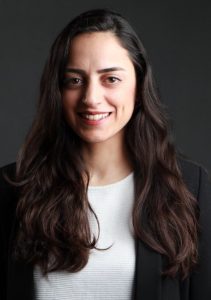
Petra Samaha is an architect, urban planner and researcher. She worked in Beirut from 2012 till 2020 on urban planning, design, and policy studies. Her work focuses on public spaces, housing, land and property, mobility, climate change, and migration. She has presented her work in several venues in Lebanon and abroad. She has also published in the Journal of Transport Geography, Jadaliyya, in “Practicing the Public” issued with As-Safir Lebanese daily, and with UNDP, UNHabitat/GLTN, and Issam Fares Institute for Public Policy and International Affairs. Petra is currently pursuing her PhD in Urban Studies and Sociology at Sciences Po – Paris.
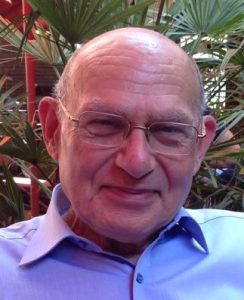
Jad Tabet is the Past-President of Lebanese Federation of Engineers and Architects (2017-2021) and of the Organization of Arab Architects (2017-2020), former Member of UNESCO World Heritage Committee (2001-2005 and 2013-2017) and Honorary President of ICOMOS LEBANON. An architect and planner working between Beirut and Paris, his practice extends over several dimensions of design and research, spanning across the fields of historic urban landscapes, public space design, the rehabilitation and revitalization of traditional urban fabrics, the development of strategies for sustainable community growth as well as social housing and public facilities. His distinguished practice in the field has earned him numerous awards, notably the Medal of the French Académie d’Architecture and the National Council of French Architects in 2014 and the Distinguished Alumni Award delivered by the FEA- American University of Beirut in 2003. Tabet taught architecture at the National Institute of Fine Arts-Lebanese University, The Faculty of Engineering and Architecture-American University of Beirut, the Belleville School of Architecture-Paris and served as distinguished Faculty at the Paris School of International Affairs (PSIA- Sciences Po Paris).
